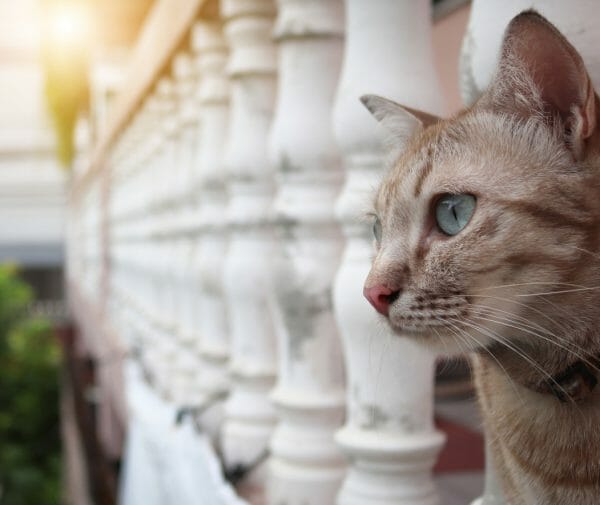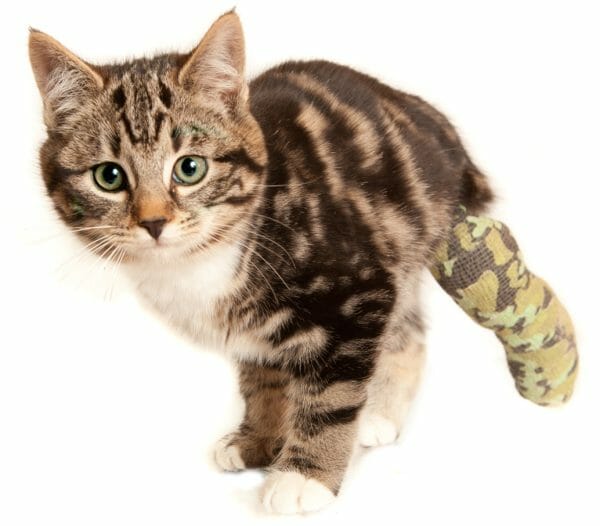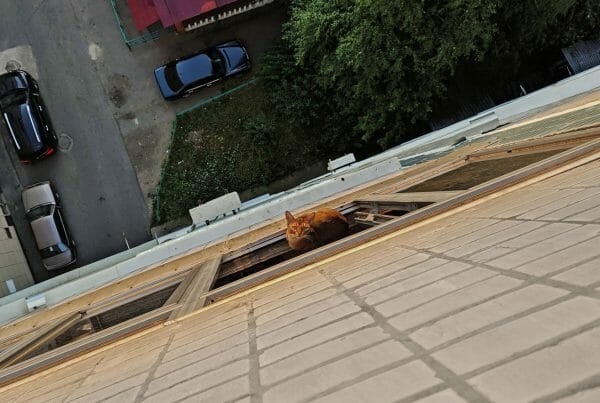What Is High Rise Syndrome in Cats?
Although cats are renowned for their ability to land on all four paws from any height, there are some exceptions to this rule. Felines that live in apartments with multiple floors may experience what is known as high rise syndrome in cats.
Cat high rise syndrome is the name given to the injuries sustained after a cat has fallen from a great height. This could be a fall from out of a window located on an upper floor, from a balcony, down a fire escape, or while jumping between ledges.
During the hot summer months, high rise syndrome seems to become more prevalent. This spike may be due, in part, to owners leaving windows open and using spaces such as balconies more often. However, high rise syndrome can occur at any point during the year.

What Types of Injuries Does High Rise Syndrome Cause?
Falling from any height can lead to serious injuries for any cat. Although a falling cat is usually able to rectify its position and part its legs in readiness to break its fall, this is not always possible as a cat may become twisted during a fall.
Common types of high-rise syndrome cat injuries include:
- Punctured lungs
- Fractured limbs
- Broken pelvis
- Shattered jawbones
- Ruptured bladder
- Broken teeth
- Spinal fractures

High Rise Syndrome in Cats Symptoms
The injuries that a cat with high rise syndrome sustains will vary depending on several factors, such as how far the cat fell, where it fell, how it landed, and so forth. As a result, there are numerous potential symptoms that may indicate that a feline has suffered an injury due to high rise syndrome. In some cases, the cat may look OK externally but may be suffering from internal injuries.
After a cat has experienced a fall, owners should be on the look for these symptoms, which are common after a fall from a great height:
- Visible wounds
- Misalignment of limbs
- Swelling or bleeding around the mouth
- A mass in the abdomen that appears painful to touch
- Vomiting
- Loss of blood
- Jaundice
In many cases, the onset of these symptoms may be delayed. Even if there are no apparent issues with a cat following a fall, it is still important to seek a full assessment from a veterinarian.
What Causes High Rise Syndrome in Cats?
Cats love spending time in high places because they provide a fantastic vantage point from which to survey its terrain. When a cat climbs a tree, it can use its claws to anchor itself to a branch. When climbing on architectural features (such as concrete ledges), the cat is unable to gain the same degree of purchase on the surface. This can be even more challenging to cats that have been declawed.
Although a cat can often remain safely on a ledge or windowsill without falling, a sudden scare such as the sound of a vacuum cleaner turning on may startle the feline, causing it to jump and fall. On other occasions, a passing bird or insect may tempt the cat to make an ill-judged lunge.

Diagnosis of High-Rise Syndrome in Cats
In many cases, it will be apparent that a cat has fallen from a window as it will be absent from the condo or apartment. When the fall has been witnessed, it is important to take the cat to a veterinarian, even if no symptoms are immediately apparent. The earlier the cat is assessed, the better the prognosis will be should it have sustained any serious injury.
A veterinarian will carry out a full and thorough physical examination to identify any injury that may be present. The veterinarian may use X-rays and ultrasounds to assess the full extent of any internal injuries.
The veterinarian will also determine the presence of any abdominal fluids. Blood work will also be taken to measure the white blood cells to see if they are high or not and also identify increases in potassium or creatinine.
High Rise Syndrome in Cats Treatment
The treatment for high rise syndrome will depend on the exact nature of the injuries that the cat has suffered. In some situations, it will be necessary to stabilize the cat before treatment is administered.
Where rupturing of internal organs has occurred, urine, blood, or other fluids may be leaking into the cat’s abdomen. In this case, emergency surgery will need to be carried out promptly.
Any broken bones will need to be realigned. This may require pins or other implants to reinforce them. The cat may also need to wear a splint during recovery. Most surgeries will be carried out under general anesthesia.
Any cat that has fallen from a great high may be in a state of shock following the trauma. To support the cat’s recovery, a feeding tube, supplemental oxygen, or intravenous fluids may be required to stabilize the cat.

Recovering From High Rise Syndrome
Once a cat has undergone an emergency surgical procedure, specific instructions will be given for any required at-home care. Following surgery, the site of the incision will need to be monitored closely to prevent infection. Antibiotics or painkillers may also be required after surgery.
When a cat has broken bones or bruised organs, it will need to rest, and activities will need to be limited until the bones are healed.
In some cases, high rise syndrome can be fatal. In situations where the cat survives a fall, prompt assessment by a veterinarian will be essential to ensure the correct treatment and surgery is given.
How to Prevent High Rise Syndrome
Cats have excellent survival instincts and will never usually leap unless it is sure it will reach the planned destination. High rise injuries are usually accidental rather than a case of misadventure.
With the correct planning and foresight, high rise syndrome can be completely avoided. Cat owners that live in high-rise properties such as apartments, condos, or houses with multiple floors should take the following steps to limit risks and prevent injury.
- Keep windows closed. Even if a window is only open a few inches, a cat can still fit through.
- Consider getting window screens if none are present.
- Ensure all window screens are secure and properly installed.
- Supervise cats when on a window ledge or balcony.
- Position furniture far away from the edge of a balcony so that cats don’t climb up and fall off.
- Neuter or spay all cats to prevent them from escaping to find a mate or spraying.




